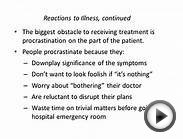 According to the American Psychological Association, health psychologists “help patients manage chronic disease and avoid preventable diseases” by “incorporating psychological theory and research to develop methods to assist patients in maintaining healthy lifestyles.”
According to the American Psychological Association, health psychologists “help patients manage chronic disease and avoid preventable diseases” by “incorporating psychological theory and research to develop methods to assist patients in maintaining healthy lifestyles.”
If you haven’t yet heard of health psychology, you will soon. Clinical health psychologist Amanda Withrow, Ph.D., who has spent over a decade working with patients with chronic illnesses, says health psychology has seen significant growth in the last 30 years.
This could reflect the shift that’s occurring in the way we perceive our health. According to Withrow, 50 to 60 years ago, “physicians had the final word [and] everybody respected that. You did what the doctor said. You didn’t argue. And you didn’t do your own research. Today, patients advocate for their own health. They do their own research. They challenge doctors. They make choices about what they want their quality of life to be.” And although we are still trying to understand the body, “there are certain things that are within our control.”
In a sentence, that is what health psychologists strive to do — educate and inform patients so that they can take control of their health. But what exactly is health psychology? Can a health psychologist potentially help you? Read on to get a detailed look at this burgeoning field from two health psychologists.
What Is Health Psychology? How Can It Help You?
“Health psychology really comes from where medicine and psychology can work symbiotically, ” Withrow said. It is taking our knowledge of mind and body and using it to understand and help individuals cope better, manage their pain and essentially learn to empower themselves.
Health psychology encompasses a wide range of issues — from chronic pain to terminal illness — with the goals of helping people improve their quality of life and addressing specific health issues. Maureen Lyon, Ph.D., clinical health psychologist and associate research professor in pediatrics at George Washington University, said, “Health psychologists do a lot of prevention work around a range of issues from preventing obesity, maintaining a positive outlook in life, preventing anxiety and depression and trying to enhance the quality of life of individuals.”
Health psychologists also play a big role in the military, helping soldiers and veterans with post-traumatic stress disorder (PTSD), life adjustment and suicide prevention.
They also promote healthy behaviors and deal with underlying psychological issues such as stress, depression and anxiety. Unlike other clinical psychologists, Withrow explained that health psychologists are trained to know about the “disease processes and physiology and how the mind and body can work together on what’s going on with a specific illness in order to help that person deal with whatever issues they are being presented with.”
Source: psychcentral.com
You might also like:





|
SECURUS - #1 CHOICE FOR ANXIETY & PANIC RELIEF - Fast Acting & Effective, All Natural, Promotes Calm and Sleep. Safe, Non-Addictive. GABA, Kava Kava, Passion Flower. 90 caps. 100% MONEY BACK GUARANTEE! Health and Beauty (Natures Elixir)
|














